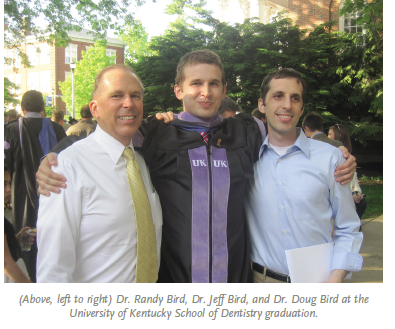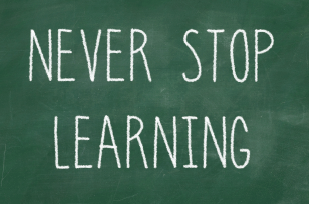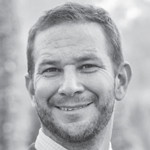
Making the Dream of Dental School a Reality.
My exposure to dentistry began when I extracted one of my younger sister’s loose primary teeth when I was about 10 or 11 years old. I literally tied a string around her tooth, tied the other end to the doorknob, and slammed the door. It worked! The tooth came out and I thought that was pretty cool.
In the late 1960s, when I was just out of high school and going to junior college, I started having a more serious interest in dentistry. Whenever I visited my dentist I asked questions, and eventually the doctor invited me to come back and observe. I accepted the invitation, and after that day I was hooked—dentistry was what I wanted to do.
Around that same time, I married my wife, Beverlee, who was a dental hygiene student. She graduated from dental hygiene school at about the time I applied to dental school. I wasn’t accepted into a program immediately, so I decided to look into dental technology. I then spent some time studying crown and bridge work, and laboratory work.
After learning skills in dental technology, I started working for a group of five dentists who had a dental laboratory in the basement of their practice. At the time, there was only one technician who was doing gold and porcelain work for them, and there was a backlog of work to do. When I joined him at the lab, we caught up in a couple of months. Eventually the other technician and I decided to start a dental lab, which we operated for about two years.
During those early days, I learned that although I liked dental laboratory work, I did not enjoy working in a basement and only seeing one other person every day. I went back to school, started taking the dental prerequisites again, and doing lab work at home to support my family.
When I completed the basic prerequisite classes and started applying to dental schools, the response I got from everyone was that everything looked good, but they wanted me to complete a bachelor’s degree. My family was growing, and by this time, my wife and I had four children. I couldn’t complete another two years of school and support my family at the same time so I put aside my plans for dentistry, and I became a landscape contractor in the Portland, OR, area for about 15 years.
A SECOND CHANCE
My dreams of dentistry remained on the back burner while my wife and I raised our five children. Then my oldest son got accepted to dental school at Oregon Health & Science University (OHSU) in Portland, OR. During his first year, I asked if I could visit the dental laboratory at the school.
I went on a Saturday and met with my son and one of his classmates. They were busy waxing gold crowns. They had been working at it for over an hour and asked me if I wanted to try. Although several years had passed since I’d done any sort of laboratory work, it came back like riding a bike. I was able to wax a decent crown in about 20 minutes.
I showed my son and his friend some tricks for getting things done just right. My son said to me, “Dad, maybe it’s not too late. Maybe you should think about going back to school.”

The next week, I made an appointment with the admissions office at OHSU. A counselor who was helping me said, “You’re not too old, but you ought to get with it!” At the time, I was 52 years old. I decided to follow her advice and get started.
After learning that Portland State University (PSU), which is near OHSU, did not offer the general chemistry or biology classes that I needed, I stopped by the community college and signed up for an inorganic chemistry class that was starting at night. Then I went home and told my wife what I had done. “You did what?” she said.
We agreed that I would try it, and if I did well in chemistry, then I would go back to school. I went to school during the spring and summer semesters and did well, so I signed up for additional classes at PSU in the fall. Thankfully, my wife returned to the workforce at a dental practice so I could stop working and concentrate on my schooling.
After two years at PSU, I was still about 20 hours short of a bachelor’s degree, but I had finished up the dental prerequisites, so I started applying to dental schools. I got a couple of interviews with schools, but did not get accepted into a program. When I followed up with the schools, they told me that they wanted candidates with degrees; all their other applicants had bachelor’s degrees, and some students had master’s degrees.
I spoke to my PSU counselor and she was able to work her magic for me. She looked at the classes that I had taken in the 1970s, and she was able to petition some of the credits to count towards a general science degree. Because of her help, I had enough credits to graduate with a bachelor’s degree.
Even with a college degree, it was difficult to find a school that would consider someone my age as a candidate. I called several private dental schools directly, and when I asked what my chances were, they said that I would be better off applying somewhere else because of my age. State schools, however, have to follow equal opportunity laws and couldn’t outright reject me just because of my age. So I focused primarily on applying to state schools.
Eventually, I was accepted into the Indiana University School of Dentistry in Indianapolis, IN, which was great because it was near my family. It was an exciting time for my whole family. My son, Doug, who had been in dental school at OHSU, was accepted for an oral surgery program at the University of Kentucky (UK) College of Dentistry. My youngest son, Jeff, also got accepted to UK into a general dentistry program a couple years later. For a period of two years, three of us were in either dental school or an oral surgery M.D. program.

CHALLENGES AND REWARDS
When I finally started dental school, many of my classmates were in their early 20s. I was 56 years old. On the first day of class, I discovered that there was a woman (a former dental hygienist) who was 52 years old. Some of the other students were in their early 30s, but I was the only dental student in the program who had grandchildren.
The younger students would show up to class and talk about all the fun they had the previous evening. But I had to study hard throughout dental school. At times, my wife and I wondered what we had gotten ourselves into.
Fortunately, part of the curriculum included laboratory work, which was easier for me since I had done it before. I grasped a lot of the concepts and was able to do well with the hands-on work.
Another challenge, which is not any different for any other student, was student loans. I started dental school about a month after my youngest child was married. I ended up with student loans, but that is a challenge with most professional programs.
Being an older dental student did have some benefits. Many of the volunteer patients I had in clinic appreciated an older student rather than somebody who was in their early 20s, because I was someone they could relate to.
SETTING UP PRACTICE
Completing all of the requirements and boards and finally graduating from dental school was a dream come true. But with any ending, there’s a new beginning. I then took steps toward becoming a practicing dentist and owning a dental practice.

When I graduated in 2010, I was lucky enough to work as an associate at an amazing dental practice in Northern California. I worked for a dentist who had graduated from dental school in the 1970s. His practice was well developed. I worked with him for two years before my wife and I decided to move to the Pacific Northwest to be closer to our family members.
I then went to work for a corporate dental group in that area for about three or four years. Finally, in September 2016, my wife and I moved to the Tri-Cities area in Washington State (a region in Southeastern Washington that includes the cities of Richland, Kennewick, and Pasco) and opened up a brand new practice. From the beginning, that was not something we had planned to do, but it just felt right. Besides, I thought that nothing could be harder than graduating from dental school.
We’ve since learned that opening a new practice is a difficult challenge, especially because there are many great dentists in the Tri-Cities area. Those first few weeks of business, my stomach was churning!
After years of planning and working towards this goal, I was ready to work, and I wanted to see patients and have a full schedule. But that did not happen right away. It took some discipline and trust to believe that the practice would grow and patients would find us. I kept telling myself to relax and the patients would come.
A DIFFERENT PERSPECTIVE
I didn’t go into dentistry for the lifestyle and the financial rewards. I wanted to practice dentistry because it’s something that I love, and because I enjoy being around people. My philosophy is that I’m doing dentistry to help my patients, if they want the help. I tell them what I diagnose, what the benefits and drawbacks are with each of the available treatments, and then my team and I try to help guide them towards a decision that will benefit them in the long run.
I probably have a different approach than I would have if I were 28 years old and just graduating from dental school. I’ve learned the value of paying for something that will last a lifetime. Overall, I try to seek out more value in life.
That means I don’t necessarily seek out the least expensive options. It means that I try to seek the most efficient, most cost-effective, and highest-quality options—and this philosophy extends to our practice. Experience has taught me that there are few solutions to problems that are quick and easy.
Some of our patients have had beautiful work done on their teeth prior to coming to my practice. We’ve got a few patients who have lots of crowns, and the last time they had a new crown was about 15 years ago. These patients come in regularly and take care of anything that starts to pop up periodontally. Their dental foundation stays healthy and the work that they’ve had done will last them the rest of their lives.
My team and I work hard to diagnose and practice comprehensive dentistry. When we put together a treatment plan, we first talk to the patient about what they’d like to accomplish. The objectives may be improved function, better aesthetics, or longer-lasting restorations.
We confirm what the patients want, and then we put together some options that will meet the objectives. One of these options will meet all the objectives, the rest of the options will not satisfy all the objectives but the cost will be lower. We try to be clear with the patients up front.
Another thing we try to do for our patients is to break down and then prioritize the treatment plan—what needs to be treated immediately, and what will need to be treated in the next one to two years, two to five years, and so on. Having a long-term, comprehensive plan has helped us with treatment planning. As Dr. Jim Downs of LêDowns Dentistry in Denver, CO, says, a good philosophy is to “help patients keep their teeth for a lifetime.”
With that in mind, we try to plan treatments that reach the desired goal instead of just fixing problems as they arise. When patients know their options, they can make educated choices for their own care.
LESSONS LEARNED
If I had to do it over again the only thing that I would change would have been to start 10 or 15 years earlier because I’d like to be able to practice dentistry longer. I love it! My advice to anyone with a lifelong dream is: Don’t think you have missed your opportunity. And don’t procrastinate. If there is something that you really want to do, don’t be afraid. If you’re willing to work for it, then jump in and go for it!
Believe in yourself and rely on the support of your family members. Whether it’s going to dental school, or learning advanced dentistry, things can get extremely difficult, but be prepared for the hard times and stick with it. It helped tremendously to have my family supporting me. My wife told me, “You can do hard things.”
As noted earlier, there were times my wife and I wondered, ‘What did we get ourselves into?’ But I really never wanted to quit for a couple of reasons. One, I had already invested too much, and two, I truly wanted to do it. I had already given up the dream of dentistry once, in the 70s, and I didn’t want to do that again. We don’t always get second chances in life, but opportunities are out there if we look for them and take them.
How many of us have everything going rosy for us every day of the year? It doesn’t happen. Life has challenges, and from those challenges, we gain experience and develop new skills. In so doing, people become more developed as human beings. I think that’s part of the value of the experience. For some of us, it’s never going to be the ideal time to pursue a lifelong goal, so why not just start now?
WHAT’S NEXT?
Looking back on the past few years, I’m happy to report that it’s all been worth it. As many dentists can attest, the best part of dentistry is meeting people, diagnosing their dental issues, and helping them improve their health.
It’s great to help patients out of pain and help them develop better function with their teeth. Or to perform cosmetic work so that patients look better and feel better about themselves. It’s very satisfying work. It’s the heart and science of dentistry combined. Our profession gives dentists an opportunity to engage both the heart and the brain.
It’s fun for me to have sons who are involved in dentistry as well. We aren’t in practice together, but I talk to my son, Doug, who is the oral surgeon, about implant cases and extraction techniques. If I’ve got a problem with some pathology, I email him an X-ray or photo and he’ll reply back and tell me what he thinks.
I have also taken some continuing education (CE) courses with my other son, Jeff, who is a general dentist. In fact, Jeff and I are currently in the New Dentist Program together at Arrowhead Dental Lab. It’s been great to work with family members and share our mutual love of dentistry together.
THE FUTURE IS BRIGHT
People ask me all the time how long I am going to practice dentistry, and the answer is until I am too old to take care of my patients! When I told my mother that I was going to go back to school with the ultimate goal of dentistry, she was very supportive. She had a classmate from high school who was living in Southern California, practicing endodontics, and he was 86 years old. I don’t know if I’ll practice dentistry that long. But I’ve learned that doing something you love isn’t much of a chore.
I’ve come to believe that if you’re happy with what you’re doing every day, you’re doing well in life. I don’t pretend to have all the answers to making one’s dreams come true. I feel like I’ve had my share of bumps along the road. But I am grateful for my second chance at dentistry and to be working in the profession of my dreams. I truly believe that if you have the drive, the desire, and the determination, you can make dreams happen. It’s never too late.









